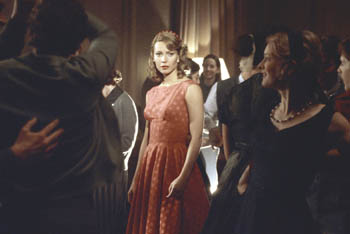![[Metroactive Movies]](/movies/gifs/movies468.gif)
[ Movies Index | Show Times | Silicon Valley | Metroactive Home | Archives ]

The Lady in Red: Gwyneth Paltrow channels Sylvia Plath in 'Sylvia.' Plath Finder Sylvia Plath onscreen: 'Twas a beast who killed the beauty. WOODY ALLEN'S GLIB LINE from Annie Hall: "Oh, Sylvia Plath, whose tragic suicide was misinterpreted as romantic by the schoolgirl mentality." Many factors killed Plath (1932-63); a short list includes the aroma of unwashed diapers, in a flat with the typically unenthusiastic English plumbing of the day; frequent power outages during the course of the worst London winter in 100 years; and Plath's own fight with madness, uncurbed by shock treatment ("They hook you up to the eastern grid and make you see sparks," says Gwyneth Paltrow, playing Plath). All these reasons for her departure are simplified in the new movie Sylvia to one important one: her husband, Ted Hughes, did it. So Sylvia is the movie they've been threatening to make for years, and now it's been done by Christine Jeffs (who made the New Zealand movie Rain). The movie shows us Plath's life, starting from her schoolgirl days at Cambridge in 1956. There she meets the poet--the better poet, I think--Ted Hughes (Daniel Craig). They endure a vacation trip to Cape Cod, a troubled session at Smith College and finally a return to London. There, a snubbed Sylvia is left behind to raise her two children, while her husband breaks her heart with affairs. Whether it's the verse of Lord Byron or Antwone Fisher, poetry read onscreen always looks insufferably high-falutin': this is the biggest obstacle to making films about poets' lives. Director Jeffs makes a kind of audio mix out of Plath's best lines, but we can only tell how good she is through the reactions of others. In one scene, Paltrow makes a crescendo out of the end of the poem "Daddy," read aloud to the crooked-looking Jared Harris, playing the poet and suicidologist A. Alvarez. And Harris' worshipful reaction is about as false as those much derided lines Marcia Gay Harden delivered about Pollock's paintings: "This time, you've broken through!" or words to that effect. Paltrow's most successful work, in Shakespeare in Love, was the part of a noblewoman discovering the delights of art, an art fueled by common-person troubles. An aristocratic actress's best hope is to serve as a bridge between the classes in the one of the few places where the two classes meet on equal terms: a movie theater. The role of an impossible woman like Sylvia Plath, the kind of striver who tried to kill herself because she couldn't get into Harvard, is one Paltrow probably shouldn't have chosen. This Plath doesn't have the tricksiness of an Ariel or the size of an avenging goddess ("I eat men like air"). Granted, the scenes at Cambridge seem uncommonly like what one reads in memoirs, regarding what a lively place the school could be in the late 1950s. We see parties, jazz bands and intellectual games--not just the chafing egos of young writers. During a later scene of a hellish dinner party, in which Paltrow demonstrates 25 shades of reproach, the film can't be accused of whitewashing the subject. Still, watching Sylvia, I was dogged by two questions: Who was this person? And if this was her, how was her husband restrained from murdering her? Sylvia is the movie that Ted Hughes--as well as Woody Allen--always dreaded.
Sylvia (R; 105 min.), directed by Christine Jeffs, written by John Brownlow, photographed by John Toon and starring Gwyneth Paltrow and Daniel Craig, opens Friday at selected theaters.
Send a letter to the editor about this story to letters@metronews.com. [ Silicon Valley | Metroactive Home | Archives ]
|
From the October 30-November 5, 2003 issue of Metro, Silicon Valley's Weekly Newspaper.
Copyright © Metro Publishing Inc. Metroactive is affiliated with the Boulevards Network.
For more information about the San Jose/Silicon Valley area, visit sanjose.com.